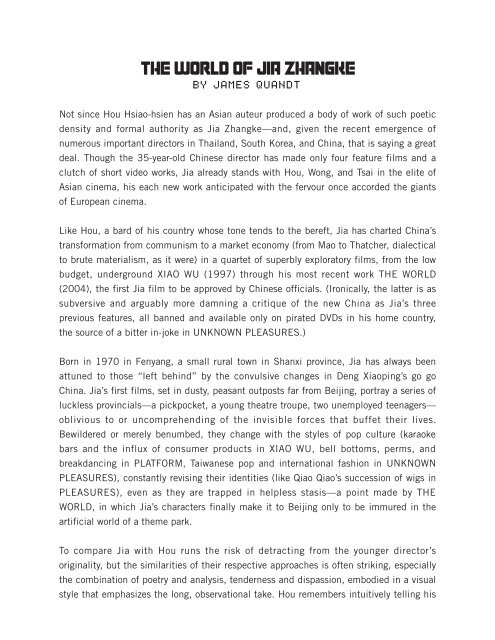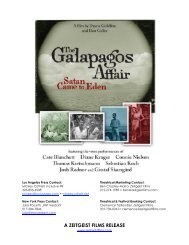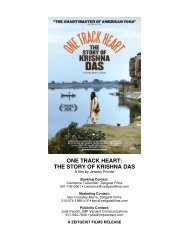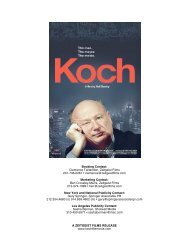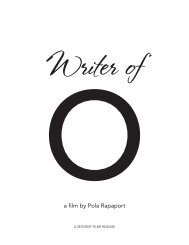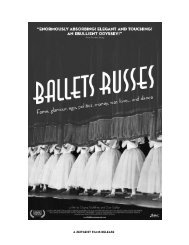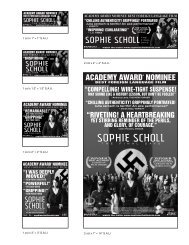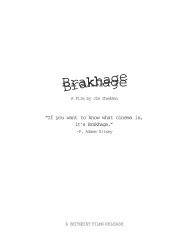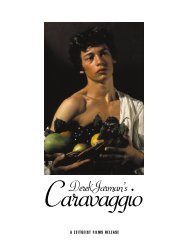Create successful ePaper yourself
Turn your PDF publications into a flip-book with our unique Google optimized e-Paper software.
THE WORLD OF JIA ZHANGKE<br />
by James Quandt<br />
Not since Hou Hsiao-hsien has an Asian auteur produced a body of work of such poetic<br />
density and formal authority as <strong>Jia</strong> <strong>Zhangke</strong>—and, given the recent emergence of<br />
numerous important directors in Thailand, South Korea, and China, that is saying a great<br />
deal. Though the 35-year-old Chinese director has made only four feature films and a<br />
clutch of short video works, <strong>Jia</strong> already stands with Hou, Wong, and Tsai in the elite of<br />
Asian cinema, his each new work anticipated with the fervour once accorded the giants<br />
of European cinema.<br />
Like Hou, a bard of his country whose tone tends to the bereft, <strong>Jia</strong> has charted China’s<br />
transformation from communism to a market economy (from Mao to Thatcher, dialectical<br />
to brute materialism, as it were) in a quartet of superbly exploratory films, from the low<br />
budget, underground XIAO WU (1997) through his most recent work THE WORLD<br />
(2004), the first <strong>Jia</strong> film to be approved by Chinese officials. (Ironically, the latter is as<br />
subversive and arguably more damning a critique of the new China as <strong>Jia</strong>’s three<br />
previous features, all banned and available only on pirated DVDs in his home country,<br />
the source of a bitter in-joke in UNKNOWN PLEASURES.)<br />
Born in 1970 in Fenyang, a small rural town in Shanxi province, <strong>Jia</strong> has always been<br />
attuned to those “left behind” by the convulsive changes in Deng Xiaoping’s go go<br />
China. <strong>Jia</strong>’s first films, set in dusty, peasant outposts far from Beijing, portray a series of<br />
luckless provincials—a pickpocket, a young theatre troupe, two unemployed teenagers—<br />
oblivious to or uncomprehending of the invisible forces that buffet their lives.<br />
Bewildered or merely benumbed, they change with the styles of pop culture (karaoke<br />
bars and the influx of consumer products in XIAO WU, bell bottoms, perms, and<br />
breakdancing in PLATFORM, Taiwanese pop and international fashion in UNKNOWN<br />
PLEASURES), constantly revising their identities (like Qiao Qiao’s succession of wigs in<br />
PLEASURES), even as they are trapped in helpless stasis—a point made by THE<br />
WORLD, in which <strong>Jia</strong>’s characters finally make it to Beijing only to be immured in the<br />
artificial world of a theme park.<br />
To compare <strong>Jia</strong> with Hou runs the risk of detracting from the younger director’s<br />
originality, but the similarities of their respective approaches is often striking, especially<br />
the combination of poetry and analysis, tenderness and dispassion, embodied in a visual<br />
style that emphasizes the long, observational take. Hou remembers intuitively telling his


